Home / Bridges of Florence / Ponte Vecchio
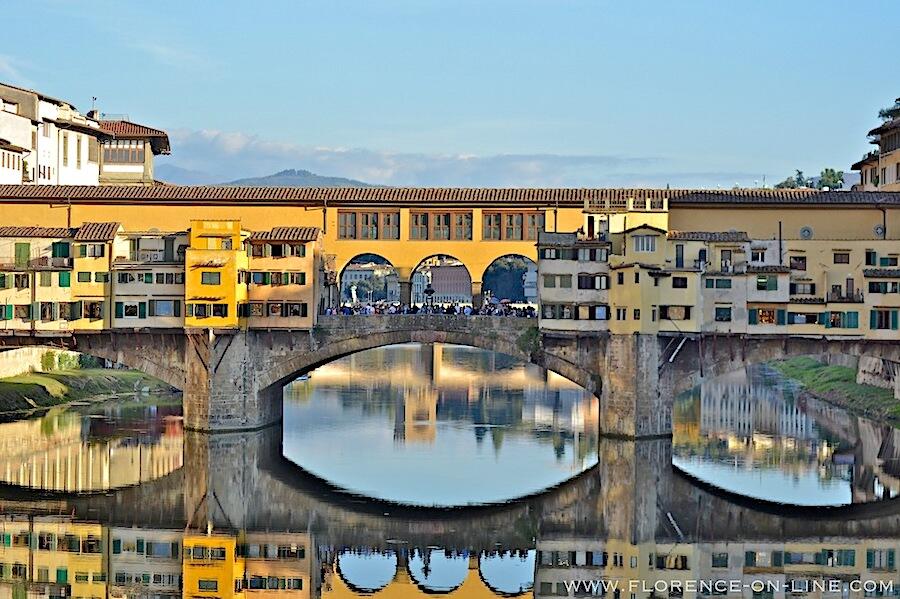
The Ponte Vecchio is the only bridge over the Arno in Florence to have survived WWII intact. All the others, including the Ponte Santa Trìnita, were destroyed by the retreating German army in 1944. The beauty and historical significance of the Ponte Vecchio was too overwhelming for the Nazis however, so instead they razed all the buildings on either side of the bridge to slow down the advancing allied forces (which accounts for the more contemporary structures on either end of the bridge). Most of the credit for this act goes to the German consul of occupied Florence, Gerhard Wolf. There is a plaque honoring Wolf in the arcaded side (east) of the center of the bridge:
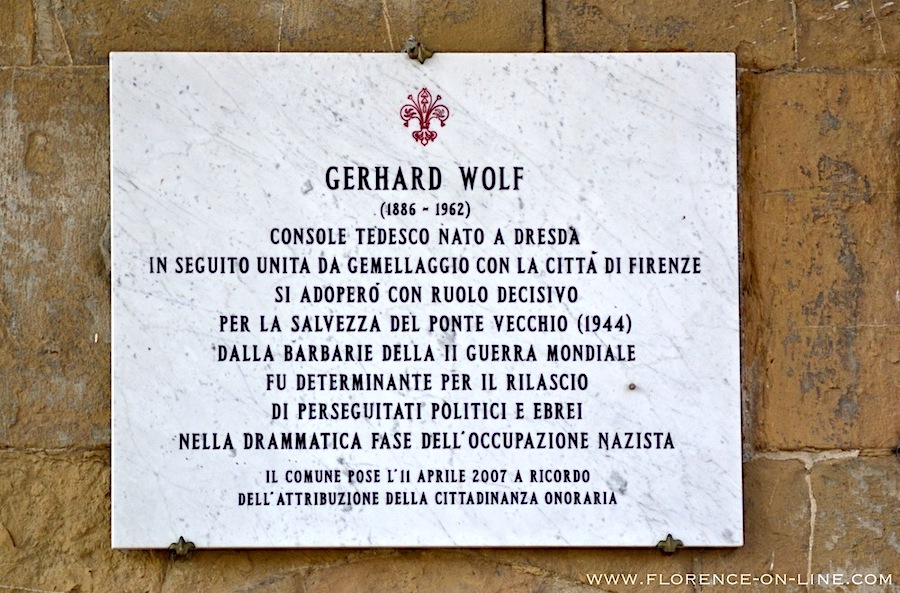
The plaque on the Ponte Vecchio commemorating the work of Gerhard Wolf. The translations is:
"GERMAN CONSUL BORN IN DRESDEN
LATER UNITED BY TWINNING WITH THE CITY OF FLORENCE
THEY WORKED WITH A DECISIVE ROLE FOR THE SALVATION OF THE PONTE VECCHIO (1944)
FROM THE BARBARISM OF WORLD WAR II
IT WAS DETERMINANT FOR THE RELEASE OF PERSECUTED POLITICAL AND JEWISH PEOPLE
IN THE DRAMATIC PHASE OF THE NAZI OCCUPATION
THE MUNICIPALITY POSITED ON 2nd APRIL 2007 TO REMEMBER
THE AWARD OF HONORARY CITIZENSHIP"
The Ponte Vecchio also survived the great flood of 1996, although it did suffer substantial superficial damages, which were repaired.
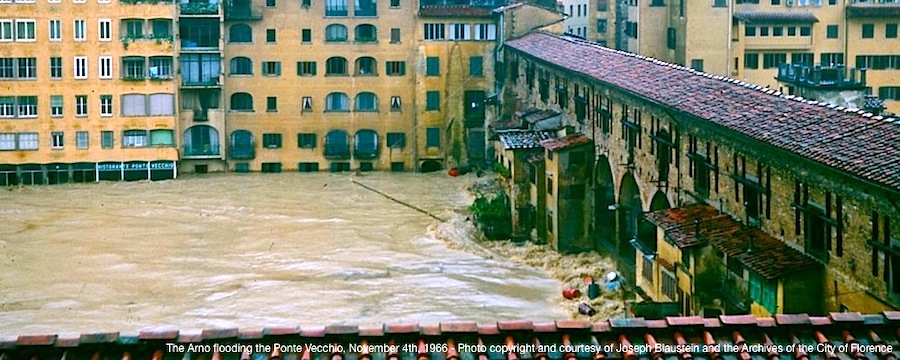
The Ponte Vecchio during the flood of 1966
Originally, the bridge was lined with the stalls of tanners, wool makers, butchers, and greengrocers, who were able to dispose of the byproducts of their trade by conveniently dumping them in the river below. In 1593, Ferdinand I, finding the squalor engendered by these professions out of keeping with the thoroughfare connecting the two main grand-ducal palaces (and not a fan of the smells supposedly!), had them replaced by decree with goldsmiths and jewelers.
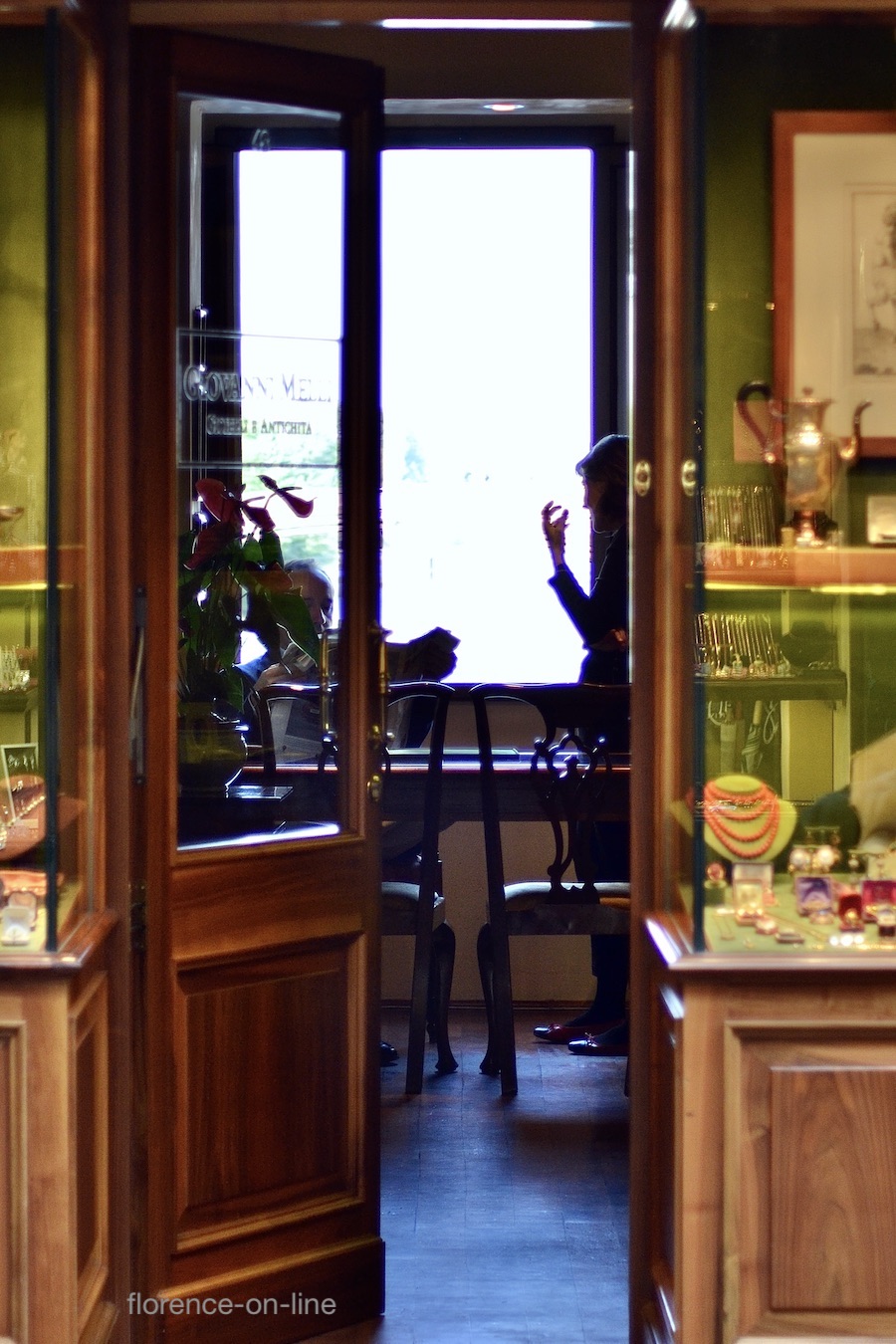
The shop of Giovanni Melli on the Ponte Vecchio (there are reports that this shop may be closed now)
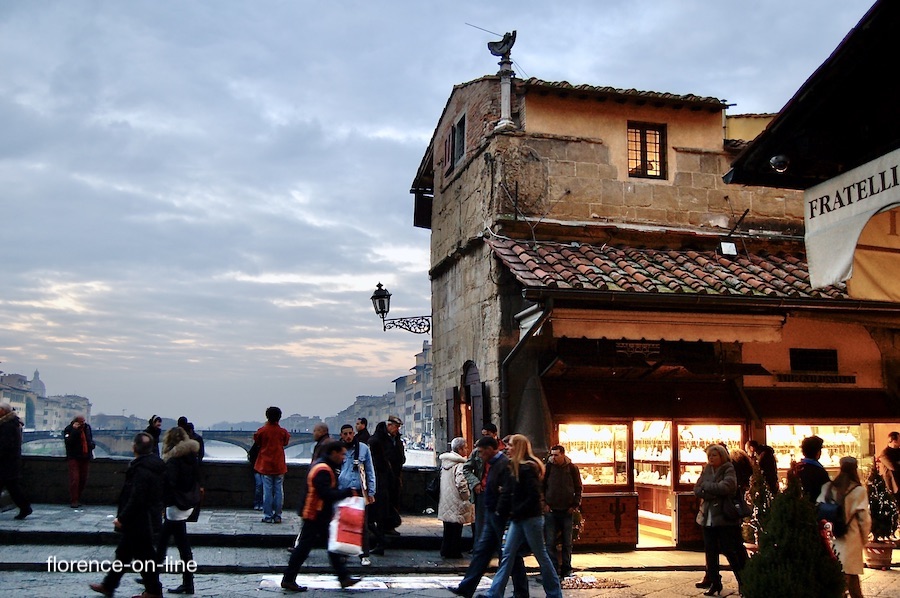
Shoppers at dusk on the Ponte Vecchio
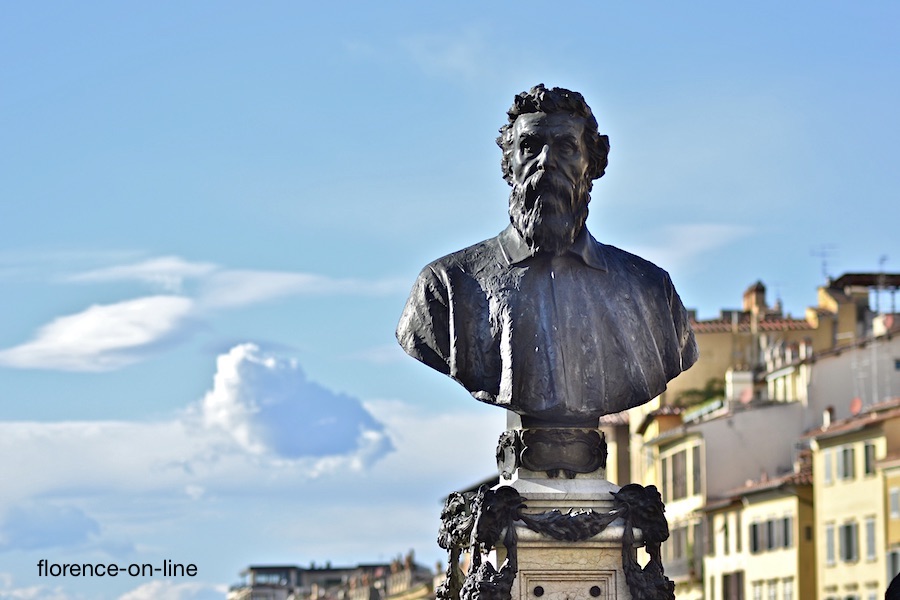
Bust of Benvenuto Cellini by Raffaello Romanelli
Recently it has become a tradition for couples to write their names on a padlock, or luchetto, attach it to the gate surrounding the bust, and throw the key into the Arno as a symbol of their undying attachment (this practice now carries a fifty euro fine). An interesting marble sundial is located near the statue, perched atop the roof of Old Bridge Galleries. Further down the bridge, towards the Oltrarno on your right, a seventeentha-century Madonna and Child with St. John attributed to Giovanni di S. Giovanni looks down from above Cassetta.
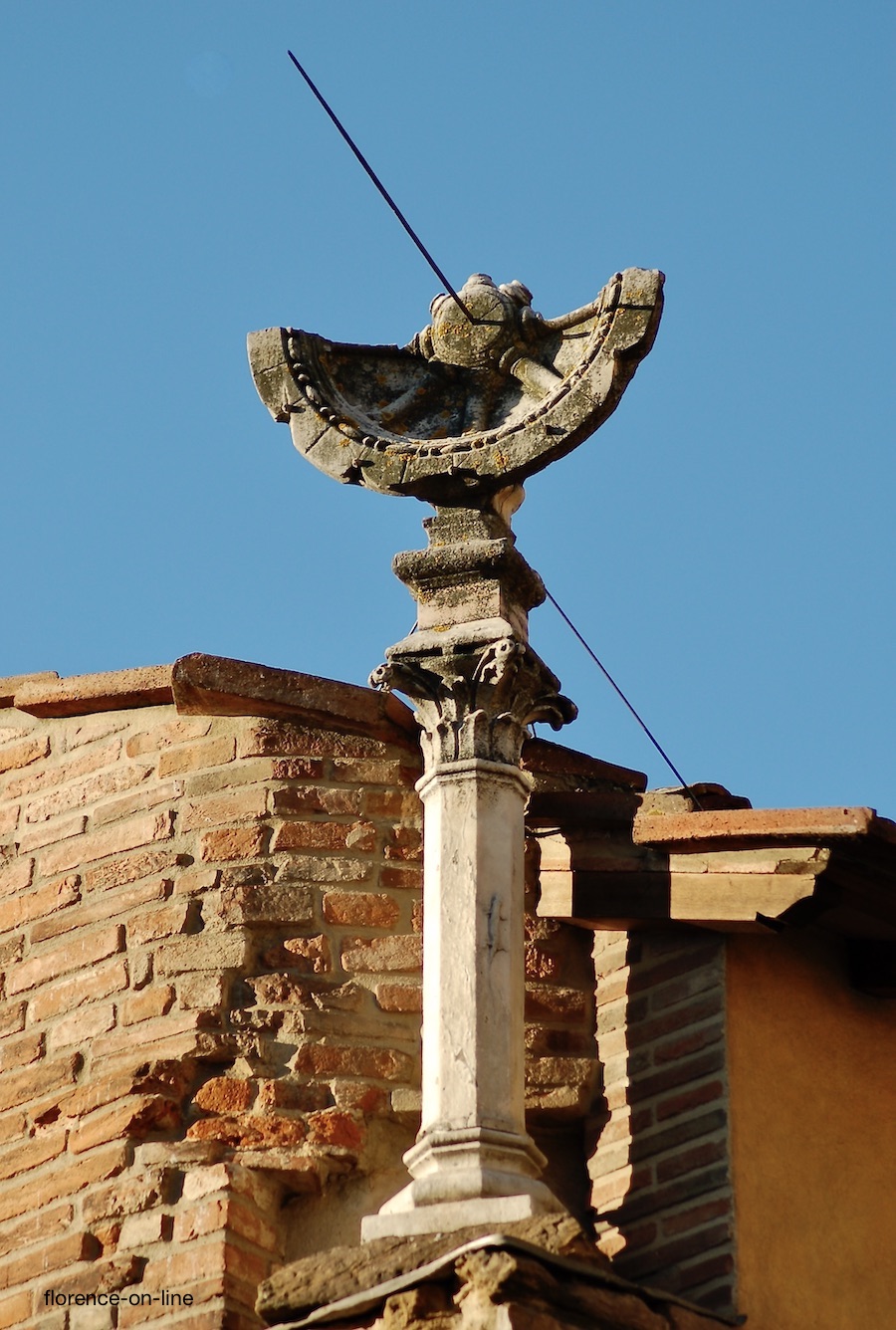
The sundial on the Ponte Vecchio - notice the lizard that is carved into the column
If you are in need of immediate refreshment, the Bar Pontevecchio is located at the end of the bridge as you cross to the opposite side of the Arno. Situated on the ground floor of Torre dei Mannelli, a 12th century tower, nice looking pizza-by-the-slice, panini, coffee, and a limited supply of gelato are available. There are tables both inside and outside, although you will pay significantly less if you drink your espresso standing at the counter. A five to ten minute ambling, unhurried walk will get you to the Pitti Palace.
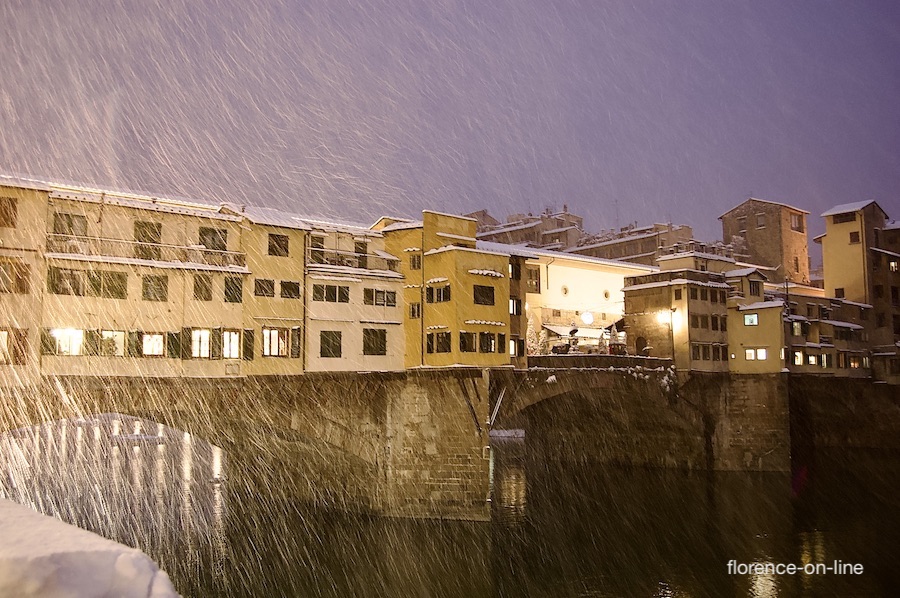
Snow falling on the Ponte Vecchio
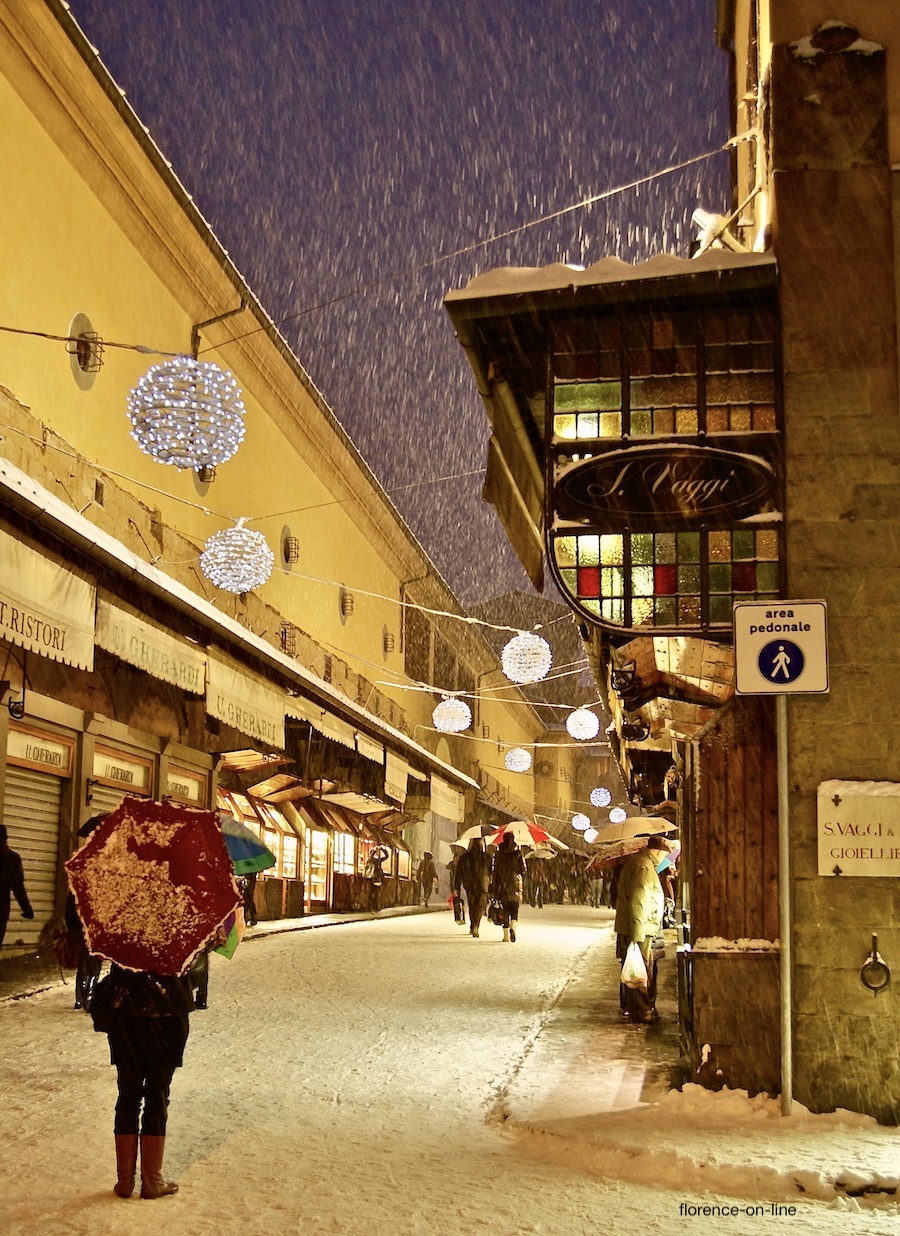
Snow and Christmas lights on the Ponte Vecchio
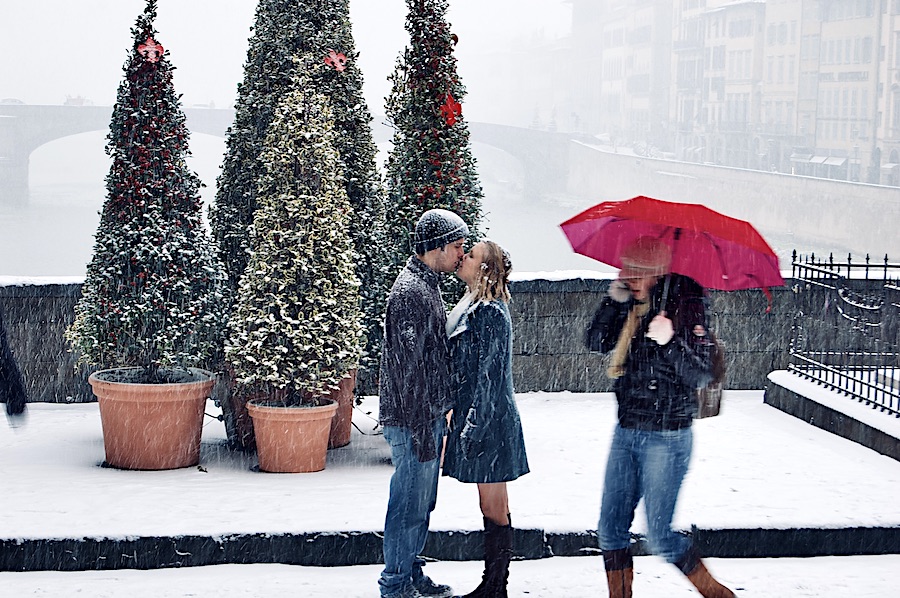
A young couple has a snowy kiss on the Ponte Vecchio
Here is a good video of the bridge with lots of different views:
And here is the Ponte Vecchio on the map:
Ponte Vecchio

The Ponte Vecchio, or "the old bridge". One of the most famous bridges in the entire world
The Ponte Vecchio, literally "the old bridge," is just that - an ancient bridge (an also one of the most beautiful and romanticized bridges in the world).
History of The Ponte Vecchio
In fact, it is the oldest bridge in Florence: a bridge on this site was first mentioned in 996 although there was probably one here since Roman times, and there are records of bridges in this location collapsing in 1117 and 1333. The current structure was erected in 1345 and has been attributed variously to Neri di Fioravante or, if Vasari is to be believed, to Taddeo Gaddi.The Ponte Vecchio is the only bridge over the Arno in Florence to have survived WWII intact. All the others, including the Ponte Santa Trìnita, were destroyed by the retreating German army in 1944. The beauty and historical significance of the Ponte Vecchio was too overwhelming for the Nazis however, so instead they razed all the buildings on either side of the bridge to slow down the advancing allied forces (which accounts for the more contemporary structures on either end of the bridge). Most of the credit for this act goes to the German consul of occupied Florence, Gerhard Wolf. There is a plaque honoring Wolf in the arcaded side (east) of the center of the bridge:

"GERMAN CONSUL BORN IN DRESDEN
LATER UNITED BY TWINNING WITH THE CITY OF FLORENCE
THEY WORKED WITH A DECISIVE ROLE FOR THE SALVATION OF THE PONTE VECCHIO (1944)
FROM THE BARBARISM OF WORLD WAR II
IT WAS DETERMINANT FOR THE RELEASE OF PERSECUTED POLITICAL AND JEWISH PEOPLE
IN THE DRAMATIC PHASE OF THE NAZI OCCUPATION
THE MUNICIPALITY POSITED ON 2nd APRIL 2007 TO REMEMBER
THE AWARD OF HONORARY CITIZENSHIP"
The Ponte Vecchio also survived the great flood of 1996, although it did suffer substantial superficial damages, which were repaired.

Originally, the bridge was lined with the stalls of tanners, wool makers, butchers, and greengrocers, who were able to dispose of the byproducts of their trade by conveniently dumping them in the river below. In 1593, Ferdinand I, finding the squalor engendered by these professions out of keeping with the thoroughfare connecting the two main grand-ducal palaces (and not a fan of the smells supposedly!), had them replaced by decree with goldsmiths and jewelers.
Jewelry Shopping on The Ponte Vecchio
The bridge as you see it now is still lined with shops selling high quality gold and jewelry, as well as a few selling upscale gloves, neckties, scarves, and watches. Many of the stores have been here for generations, and are almost like jewels themselves, each tiny shop having a giant picture window with a gorgeous view of the Arno inside, and intricate wooden enclosures on the outside. The stores specialize in a variety of types of jewelry: Gherardi focuses on coral beads, for example, while Audemars Piguet specializes in fine Swiss watches. These are just a couple of the several stores on the bridge - you could spend most of a day if you visited each one.

The Ponte Vecchio Today
Aside from these more glittering attributes, the Ponte Vecchio boasts other points of interest. Above the stores on the left side of the bridge facing away from the city is the Corridoio Vasariano, or Vasarian Corridor, part of the covered passageway built by Vasari in 1565 to connect the Palazzo Vecchio and the Pitti Palace. At the center of the bridge there is a short break in the line of shops, giving pedestrians a view in either direction of the Arno. Here you will find a small fountain topped with the nineteenth-century bust of the famous renaissance goldsmith Benvenuto Cellini, erected on the 400th anniversary of his birth.
Recently it has become a tradition for couples to write their names on a padlock, or luchetto, attach it to the gate surrounding the bust, and throw the key into the Arno as a symbol of their undying attachment (this practice now carries a fifty euro fine). An interesting marble sundial is located near the statue, perched atop the roof of Old Bridge Galleries. Further down the bridge, towards the Oltrarno on your right, a seventeentha-century Madonna and Child with St. John attributed to Giovanni di S. Giovanni looks down from above Cassetta.

If you are in need of immediate refreshment, the Bar Pontevecchio is located at the end of the bridge as you cross to the opposite side of the Arno. Situated on the ground floor of Torre dei Mannelli, a 12th century tower, nice looking pizza-by-the-slice, panini, coffee, and a limited supply of gelato are available. There are tables both inside and outside, although you will pay significantly less if you drink your espresso standing at the counter. A five to ten minute ambling, unhurried walk will get you to the Pitti Palace.
The Ponte Vecchio in The Snow
On the evening of December 17, 2010, there was a rare Florentine snow fall. Here are a couple of photos from that night.


Here is a good video of the bridge with lots of different views:
Comments:
Last update:
What's New?
-
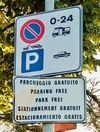
Florence Parking Guide & Map
Feb 23, 2026
-

Top Ten Luxury Hotels in Florence
Feb 9, 2026
-

Piazza San Marco
Jan 5, 2026
-
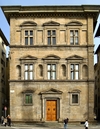
Piazza Santa Trìnita
Dec 2, 2025
-

Ceramics Fair (Fiera della Ceramica)
Oct 1, 2025
Top experiences in and around Florence:
© 2005-2026 florence-on-line.com | About | Glossary | Newsletter | Site Map
Some links to external websites may be affiliate links (hotel bookings, guide books, activities, etc.). Using these services helps to support our efforts here with no additional costs to the user (you!).
Some links to external websites may be affiliate links (hotel bookings, guide books, activities, etc.). Using these services helps to support our efforts here with no additional costs to the user (you!).